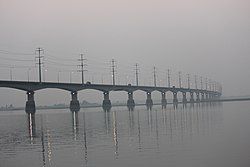Sirajganj Sadar Upazila
Sirajganj Sadar
সিরাজগঞ্জ সদর | |
|---|---|
 | |
 | |
| Coordinates: 24°27.5′N 89°42′E / 24.4583°N 89.700°E | |
| Country | |
| Division | Rajshahi |
| District | Sirajganj |
| Headquarters | Sirajganj |
| Area | |
• Total | 320.15 km2 (123.61 sq mi) |
| Population | |
• Total | 631,928 |
| • Density | 2,000/km2 (5,100/sq mi) |
| Time zone | UTC+6 (BST) |
| Postal code | 6700[2] |
| Area code | 0751[3] |
| Website | Official map of Sirajganj Sadar |
Sirajganj Sadar (Bengali: সিরাজগঞ্জ সদর) is an upazila, or sub-district of Sirajganj District, located in Rajshahi Division, Bangladesh.[4]
Geography
[edit]Sirajganj Sadar is located at 24°27′30″N 89°42′00″E / 24.4583°N 89.7000°E. It is bounded by Kazipur upazila on the north, Kamarkhanda and Belkuchi upazilas on the south, Sarishabari, Kalihati and Bhuapur upazilas on the east, Kamarkhanda, Raiganj and Dhunat upazilas on the west.[5]
Demographics
[edit]According to the 2011 Census of Bangladesh, Sirajganj Sadar Upazila had 125,485 households and a population of 555,155. 130,591 (23.52%) were under 10 years of age. Sirajganj Sadar had a literacy rate (age 7 and over) of 47.96%, compared to the national average of 51.8%, and a sex ratio of 989 females per 1000 males. 167,200 (30.12%) lived in urban areas.[7][8]
As of the 1991 Bangladesh census, Sirajganj Sadar has a population of 389,160. Males constitute are 51.54% of the population, and females 48.46%. This upazila's eighteen up population is 195,911. Sirajganj Sadar has an average literacy rate of 29.8% (7+ years), and the national average of 32.4% literate.[9]
Administration
[edit]Sirajganj Sadar Thana was formed under Mymensingh district in 1772 and it was turned into an upazila in 1984.[10]
Sirajganj Sadar Upazila is divided into Sirajganj Municipality and ten union parishads: Bagbati, Bohuli, Kaliahoripur, Khokshabari, Kawakhola, Mechhra, Ratankandi, Shialkol, Chhongachha, and Soydabad. The union parishads are subdivided into 187 mauzas and 294 villages.[7]
Sirajganj Municipality is subdivided into 15 wards and 50 mahallas.[7]
Education
[edit]This section may require cleanup to meet Wikipedia's quality standards. The specific problem is: mass of unformatted text. (February 2022) |
Sirajganj Sadaar upazila boasts numerous educational institutions including:
Shaheed M. Munsur Ali Medical College (2014), North Bengal Medical college (2001), Sirajganj Government College (1940), Islamia Government College (1921), Rashiddozzoha Government Women's College(1966), Bhashani Degree College(1994), Rajob Ali Memorial Science College(1999), Abdullah al Mahmud Degree college(1987), Sirajganj Govt. MATS, Sheikh Hasina Nursing College, Sirajganj Government Technical College(1966), Sirajganj Polytechnic Institute(2000), B.L Government Boys High School(1869), Bagbati High School(1866), Jnanadainy High School(1882), Victoria High School(1898), Char Songachha Islamia Fazil Madrasah (1919), Bhatpiary J.R.S High School(1933), Saleha Ishaque Government Girls High School(1937), Mesra High School(1948), Gotia High school(1982), Rupsha High School(1989), Suchona Kinder Garten High School-Rupsha(2003), Sabuj Kanan High School (1980), Siajganj Collectorate School & College(2003), Jewels oxford international school(2002), Haji Ali Ahmad High School(1947), Jahanara High School(1969), Gowri-Urban High School(1968), S.B Railway Colony High School & College(1964), PDB High school(1973), Police Line School & College(2011), Shaheed Model School(2012), Goyla Model Govt. Primary School(1845).
Notable people
[edit]- Abdullah al Mahmood, lawyer and politician, was born in Sirajganj in 1902.[11]
- Iqbal Hasan Mahmud Tuku, former minister and politician
- Rumana Mahmood, politician
- Abdullah-Al-Muti, science educator and writer, was born at Fulbari in 1930.[12]
See also
[edit]References
[edit]- ^ National Report (PDF). Population and Housing Census 2022. Vol. 1. Dhaka: Bangladesh Bureau of Statistics. November 2023. p. 402. ISBN 978-9844752016.
- ^ "Bangladesh Postal Code". Dhaka: Bangladesh Postal Department under the Department of Posts and Telecommunications of the Ministry of Posts, Telecommunications and Information Technology of the People's Republic of Bangladesh. 21 October 2024.
- ^ "Bangladesh Area Code". China: Chahaoba.com. 18 October 2024.
- ^ Islam, Kamrul (2012). "Sirajganj Sadar Upazila". In Sirajul Islam; Miah, Sajahan; Khanam, Mahfuza; Ahmed, Sabbir (eds.). Banglapedia: the National Encyclopedia of Bangladesh (Online ed.). Dhaka, Bangladesh: Banglapedia Trust, Asiatic Society of Bangladesh. ISBN 984-32-0576-6. OCLC 52727562. OL 30677644M. Retrieved 10 January 2025.
- ^ Kamrul Islam (2012), "Sirajganj Sadar Upazila", in Sirajul Islam and Ahmed A. Jamal (ed.), Banglapedia: National Encyclopedia of Bangladesh (Second ed.), Asiatic Society of Bangladesh
- ^ Population and Housing Census 2022 - District Report: Sirajganj (PDF). District Series. Dhaka: Bangladesh Bureau of Statistics. June 2024. ISBN 978-984-475-229-0.
- ^ a b c "Bangladesh Population and Housing Census 2011 Zila Report – Sirajganj" (PDF). bbs.gov.bd. Bangladesh Bureau of Statistics.
- ^ "Community Tables: Sirajganj district" (PDF). bbs.gov.bd. Bangladesh Bureau of Statistics. 2011.
- ^ "Population Census Wing, BBS". Archived from the original on 2005-03-27. Retrieved November 10, 2006.
- ^ "Sirajganj Sadar Upazila". Banglapedia. Retrieved 2023-02-27.
- ^ Barque, A. M., ed. (1963). Barque's Pakistan Trade Directory and Who's Who. Barque & Company. p. 14. OCLC 1645066.
- ^ Miah, Sajahan (2012). "Sharafuddin, Abdullah Al-Muti". In Sirajul Islam and Ahmed A. Jamal (ed.). Banglapedia: National Encyclopedia of Bangladesh (Second ed.). Asiatic Society of Bangladesh.

